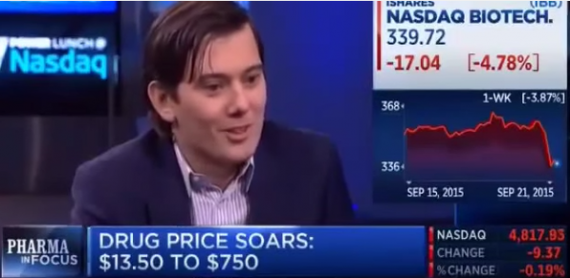The term 'Internet justice' refers to when an angry mob of Internet users seek retribution for egregious acts through any form of punishment they can conjure up with the tapping of keys. It is seen by many as unruly, lawless group behavior that obstructs the real justice system, as it is an unchecked force that frequently operates on incomplete or inaccurate information, often with a response that is disproportionate to the actual offense. More times than not, Internet justice is less a form of vigilantism and more an old-fashioned witch-hunt in virtual form.
However, it appears that last week the Internet mob exacted justice swiftly and fairly when the law failed to do so, bestowing its wrath upon a young entrepreneur with a flair for morally reprehensible business practices. The online backlash served the purpose of a pharmaceutical regulatory body when it successfully pressured 32-year-old CEO of Turing Pharmaceuticals, Martin Shkreli, to drop the price of a life-saving drug whose cost he recently raised by 5000%--from $13.50 a pill to $750.
The drug is named Daraprim, and it is typically used to treat a specific type of infection--known as toxoplasmosis--which can prove fatal for patients with compromised immune systems, like those with AIDs or cancer. Since only about 2,000 patients need Daraprim each year, it is not worth it for other manufacturers to join such a niche market. This leaves Shkreli and Turing Pharmaceuticals with a monopoly over the drug, essentially giving him the ability to charge whatever he wants, no matter how outrageous and inaffordable of a figure it may be. When it's a matter of life or death, sufferers have no choice but to dish out whatever amount is high enough to satisfy the greedy needs of Big Pharma evil villain millionaires, or the young, glib, empathy-lacking sociopaths who aspire to be one. It is an example of capitalism at its worst.
This all sounds so heinous that it is hard to imagine that such a thing is allowed by law, but unfortunately immoral doesn't always mean illegal. Spiking the price of commodities in this way is referred to as "price gouging", and although it is generally viewed as exploitative and unethical, it is still 100% legal. Although price gouging is no secret to politicians, it is obvious that lawmakers are not doing nearly enough to prevent these despicable and potentially deadly practices.
Fortunately, the loud voices of enraged social media users did not completely fall upon deaf ears. Shortly after the story made its rounds on the Internet and into national news, presidential candidate Hillary Clinton publicly rebuked Shkreli's actions in a tweet that vowed to introduce a plan designed to combat price gouging. However, a mere plan for the future is completely useless to the thousands of people who will need Daraprim this year. Without some sort of regulatory body in place to ensure that companies don't behave unethically in terms of medication pricing, we are all left almost helpless to do something about it. The keyword being 'almost'.
Since Shkreli's story hit the web on Sunday, Sept. 20th via The New York Times, he has received over 50,000 negative tweets and his fair share of death threats. Beyond this, private email exchanges between him and his employees were published online, along with all of his personal information. One can only imagine how long his phone has been ringing off the hook in recent days, how many pizzas have been delivered to his door, or how many times he's had to look over his shoulder. But what is known is that through being pummeled by the forces of the Internet for 48 hours, he was essentially forced to vow to substantially reduce the price hike. Although it is unlikely that the cost will return to the same as before the incident, the decrease will presumably be significant enough to ward off most of the white knights behind monitors everywhere. And if not, we can be sure that he will have to fiercely battle Internet crusaders once again.
So what is the moral of this story? It's that sometimes the law doesn't suffice when it comes to justice, and in certain cases, lives may be lost as a result. In such cases, an active and effective Internet mob can function as a much-needed overseer, making sure that ethical conduct is followed when it cannot be legally enforced. In this instance, the mob will be directly responsible for making life-altering medication more affordable to those in need.
Passing new legislation is slow, but the law of the Internet acts fast and hard, and it just may be time to reevaluate whether that is always such a bad thing.

